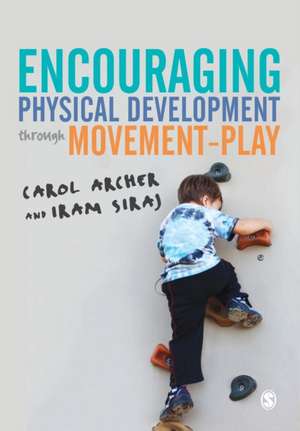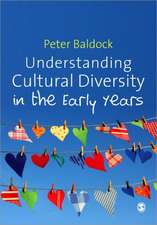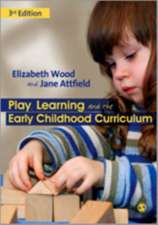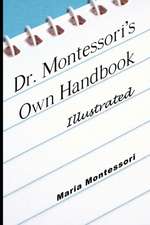Encouraging Physical Development Through Movement-Play
Autor Carol Archer, Iram Sirajen Limba Engleză Paperback – 10 iun 2015
- how movement play links with all the areas of early childhood development
- physical activity guidelines for young children
- practical advice and photos to support implementation in settings
- how to assess your own setting
- how to best work with parents on this topic
- comprehensive guidance on writing a physical development policy
| Toate formatele și edițiile | Preț | Express |
|---|---|---|
| Paperback (1) | 383.01 lei 6-8 săpt. | |
| SAGE Publications – 10 iun 2015 | 383.01 lei 6-8 săpt. | |
| Hardback (1) | 913.93 lei 6-8 săpt. | |
| SAGE Publications – 10 iun 2015 | 913.93 lei 6-8 săpt. |
Preț: 383.01 lei
Nou
Puncte Express: 575
Preț estimativ în valută:
73.30€ • 76.32$ • 61.95£
73.30€ • 76.32$ • 61.95£
Carte tipărită la comandă
Livrare economică 10-24 martie
Preluare comenzi: 021 569.72.76
Specificații
ISBN-13: 9781446297124
ISBN-10: 1446297128
Pagini: 176
Dimensiuni: 170 x 242 x 15 mm
Greutate: 0.3 kg
Ediția:1
Editura: SAGE Publications
Colecția Sage Publications Ltd
Locul publicării:London, United Kingdom
ISBN-10: 1446297128
Pagini: 176
Dimensiuni: 170 x 242 x 15 mm
Greutate: 0.3 kg
Ediția:1
Editura: SAGE Publications
Colecția Sage Publications Ltd
Locul publicării:London, United Kingdom
Recenzii
If you are interested in how to create more enriching, playful, movement experiences with young children, this book will show you how! The book is a must for all those interested in promoting physical development in the early years, it is practical but underpinned by helpful theory including the links between physicality and later academic success. The authors are able to draw on their vast collective experiences and provide an evidence-based resource that I would highly recommend to all early childhood educators; including those in early primary schools.
This book is going to be very influential and will be a seminal text for all practitioners and students wanting to hone their knowledge about how children think and learn best. The authors are Iram Siraj, an academic of giant stature in the field of Early Childhood having been involved over the years in many influential research projects, and Carol Archer whose work as a hands- on practitioner, advisory teacher and academic brings the ‘street cred’ to this book that practitioners relate to. The importance of physical play and movement has been grossly underemphasised in the training of early years practitioners but this resource will undoubtedly redress the balance and lend academic rigour and authority to the place of movement in the curriculum for young children and what we offer babies and toddlers. It will give the reader an extremely helpful overview as it stresses the importance of movement play as the common denominator of all learning. Always backed up by convincing research evidence the first chapter explains in depth what is going on in the brain and the body when children move.
Vigorous movement is essential for health. Being overweight or obese in childhood is a predictor of later health troubles in adult life and yet in the case studies undertaken for this book, adults in pre-school settings were shown to be reluctant to plan for, engage or intervene in movement and physical play with the children. They were unaware of the Department of Health guidelines that children should have 180 minutes (3 hours ) of physical activity in the day and that all under 5s should minimize the amount of time spent being sedentary (being restrained in car seats or buggies or in sitting) for extended periods . Play is synonymous with movement and a play-based environment offers children what they need to grow and learn best. There is an emphasis on the importance of the outdoors throughout the book.
But knowing the theory is one thing, implementing it is quite another. The book is practical too. It is excellent in guiding practitioners and especially managers and leaders on how to implement a curriculum based on movement for children from birth to 6 years of age. These practical guidelines are clearly illustrated with helpful photos. Siraj and Archer have also devised a Movement Play Scale (MPS) as a way of assessing the quality of movement –play. The descriptors help to place the setting as inadequate through to excellent.
The last chapter is incredibly full and concentrated! It contains step-by-step support in devising a physical development policy where all concerned are given a voice including parents.
The references run to many pages and cover literature from national and international research, and experts in the field of early childhood, education, pedagogy, health, neuroscience, physiology, biological science, psychology, sociology and medicine.
I found this book extremely helpful and will use it in my work with teachers and practitioners and recommend it to all involved in the care and education of young children and their teachers and carers.
This book is going to be very influential and will be a seminal text for all practitioners and students wanting to hone their knowledge about how children think and learn best. The authors are Iram Siraj, an academic of giant stature in the field of Early Childhood having been involved over the years in many influential research projects, and Carol Archer whose work as a hands- on practitioner, advisory teacher and academic brings the ‘street cred’ to this book that practitioners relate to. The importance of physical play and movement has been grossly underemphasised in the training of early years practitioners but this resource will undoubtedly redress the balance and lend academic rigour and authority to the place of movement in the curriculum for young children and what we offer babies and toddlers. It will give the reader an extremely helpful overview as it stresses the importance of movement play as the common denominator of all learning. Always backed up by convincing research evidence the first chapter explains in depth what is going on in the brain and the body when children move.
Vigorous movement is essential for health. Being overweight or obese in childhood is a predictor of later health troubles in adult life and yet in the case studies undertaken for this book, adults in pre-school settings were shown to be reluctant to plan for, engage or intervene in movement and physical play with the children. They were unaware of the Department of Health guidelines that children should have 180 minutes (3 hours ) of physical activity in the day and that all under 5s should minimize the amount of time spent being sedentary (being restrained in car seats or buggies or in sitting) for extended periods . Play is synonymous with movement and a play-based environment offers children what they need to grow and learn best. There is an emphasis on the importance of the outdoors throughout the book.
But knowing the theory is one thing, implementing it is quite another. The book is practical too. It is excellent in guiding practitioners and especially managers and leaders on how to implement a curriculum based on movement for children from birth to 6 years of age. These practical guidelines are clearly illustrated with helpful photos. Siraj and Archer have also devised a Movement Play Scale (MPS) as a way of assessing the quality of movement –play. The descriptors help to place the setting as inadequate through to excellent.
The last chapter is incredibly full and concentrated! It contains step-by-step support in devising a physical development policy where all concerned are given a voice including parents.
The references run to many pages and cover literature from national and international research, and experts in the field of early childhood, education, pedagogy, health, neuroscience, physiology, biological science, psychology, sociology and medicine.
I found this book extremely helpful and will use it in my work with teachers and practitioners and recommend it to all involved in the care and education of young children and their teachers and carers.
Cuprins
Movement-play and its influence on young children's development
Making the case for physical activity
Implementing a movement-play-based curriculum for children from birth to six years of age
Improving the quality of movement-play: a small-scale study
Working with families to promote movement-play
Leading and managing the implementation of movement-play from practice to policy: a whole setting approach
Making the case for physical activity
Implementing a movement-play-based curriculum for children from birth to six years of age
Improving the quality of movement-play: a small-scale study
Working with families to promote movement-play
Leading and managing the implementation of movement-play from practice to policy: a whole setting approach
Notă biografică
Descriere
Movement-play encourages physical activity in a child-led manner for the benefit of children's health, learning and wellbeing.
This book looks at the theory behind the importance of movement and how 'movement-play' works within settings along with practical advice on its implementation.
This book looks at the theory behind the importance of movement and how 'movement-play' works within settings along with practical advice on its implementation.










